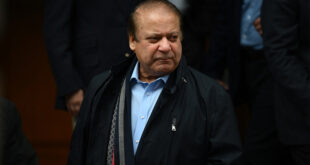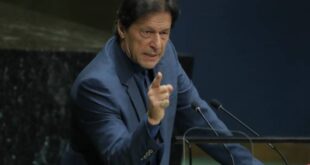
By:
Usman Ali
Special Correspondent Pride News
Military establishment raised problematic child Ex-prime minister Imran khan: Real Pakistan

Recently, there have been intensified and deliberate attempts to drag Pakistan’s Armed Forces and their leadership in ongoing political discourse in the country,” former prime minister Imran Khan has alleged that “some elements” in the powerful establishment who indulged in “bad practices” were responsible for his unceremonious ouster from power. , Imran said: “There are also humans in institutions. If one or two individuals do something wrong, the entire institution is not responsible. If one person (in an apparent reference to Army chief Gen. Bajwa) makes a mistake, this does not mean that the whole institution is at fault.
Pakistan have claimed that this is the first time in Pakistan’s history when a civilian leader is targeting the country’s powerful military establishment and even forcing it to pick sides. In this fight, even the PTI supporters also came out and start using the social media to target the army, especially Gen Bajwa, for doing nothing to save Imran Khan’s government, whereas, other PTI leaders are regularly tagging ISPR in their propaganda tweets against the ruling government and questioning the army’s neutrality.
Pakistan’s powerful army warned its critics on Sunday to avoid throwing dirt on the premier institution as it took “strong exception” to “intensified and deliberate attempts” to drag it in politics after the removal of the government of Imran Khan last month. an antiarmy hashtag generated over 69,000 tweets and a similar one over 410,000 tweets in the past few days. The Federal Investigation Agency had also launched a crackdown to arrest those defaming the army. Lately, a video clip by the anchorman of Bol TV, Sami Ibrahim, criticizing General Bajwa
went viral prompting the FIA to start an inquiry against him.
The 69-year-old cricketer-turned politician was voted out of power last month through a
no-confidence motion, which he alleges was masterminded by the US with the help of
local players over his pursuance of an independent foreign policy. His supporters used
social media to target the army for doing nothing to save his government.
Pakistan Armed Forces take strong exception to such unlawful and unethical practice and
expect all to abide by the law and keep the Armed Forces out of political discourse in the
best interest of the country. The army has ruled Pakistan for almost half of its history and
played a behind the scene role in sending home various elected governments. However,
it did not stop Punjab Governor Omar Sarfraz Cheema who on Thursday sought the
army’s intervention to lead the province out of the crises.
In a letter to Army chief Gen Qamar Javed Bajwa, Cheema requested him to play a
defining role in the current chaotic times, as he was of the opinion that the constitutional
crisis-ridden Punjab had been held hostage. The issue started when General Faiz
Hameed who was considered to be mastermind of ousting Nawaz sharif government in
Panama paper issue appointed as a core commander Peshawar, at that time he was
working as a Director General ISI the top chief of Pakistan Army spy agency and was
under the direct command of Imran khan. Imran khan never wanted to replace faiz
hameed but there is always a procedure of appointments in Pakistan Army. the
procedure for appointment of the ISI director general is neither mentioned in the
Constitution nor the Army Act, and all previous appointments were made as per traditions
under which the army chief proposes three names to the prime minister who then makes
the final decision. And finally conflict arose and ended in chaos.
Khan’s nationalist politics have already polarized Pakistan. Now he’s emerged as
an even more dangerous loser. Pakistan has rapidly lurched into disarray after Imran
Khan became the country’s first prime minister to be removed from power in a
parliamentary vote of no confidence on April 10. Khan made stunning allegations,
accusing the United States of plotting a coordinated conspiracy with a motley coalition of
Pakistani opposition parties to topple his government.
While Washington has dismissed the , they have put renewed strain on
Pakistan’s long-troubled relationship with the United States, an important security and
economic partner. The spectacle of Khan’s removal has also increased the dangers of
countless smoldering fires across Pakistan’s political, religious, and militant spectrums
waiting to be lit. Khan has nevertheless baited the country’s generals to act and militarily
intervene on his behalf, believing their intervention now would only strengthen his hand.
Moreover, while stoking Pakistan’s anti-Americanism domestically, he simultaneously
understands that Washington could not endorse any intrusion by the Pakistan Army
particularly a bloody one. Were the Army to take Khan into custody now, it would only
make him a political martyr and, ironically, likely secure him Western political support.
The Real Drama

Despite losing the parliamentary majority on March 30, he refused to recognize that his
Imran Khan-only shambolic governance, mismanagement of the economy, foreign-policymishaps, and disagreements with his military overlords had crumbled the walls of his
political sandcastle. Instead, he persisted by deploying various schemes to remain in
power, including cooking up a narrative of a U.S. conspiracy to evoke Pakistani
nationalism and patriotism as a force multiplier, subduing Pakistan’s constitution by
blocking a no-confidence vote against him, and trampling the country’s shaky democratic
process by dissolving Pakistan’s parliament. Khan even attempted to prolong the
parliamentary proceedings to further stir political chaos and possibly to convince
Pakistan’s powerful military to declare martial law. The military has consistently managed
to call the shots without firing a shot over the past 45 years.
In Khan’s case, while his political rise and downfall were no accident, the irony of both
episodes is rather uncanny. In a widely contested 2018 vote marred by accusations of
election engineering, Pakistan’s whiskey-drinking generals groomed Khan into power.
Khan used the opportunity to rebrand himself as a populist alternative to Pakistan’s
dynastic power holders.
It is likely that Khan aspired from the outset to ultimately push the generals aside, rather
than aiming to settle for being their frontman. Cleverly, Khan took advantage of the
generals’ narrowly focused view of all prospective threats through an Indian prism, while
the real danger to them might have been him.
Nevertheless, while Khan largely delivered on his pledges to the military, every Pakistani
military asset has an expiration date—as did Khan. Khan’s original sin was his
disagreements with his military overlords—foremost, the dominant Army chief, Gen.
Qamar Javed Bajwa—over various policy and personnel issues. General Faiz Hameed,
who has since been removed as spy chief, might have seen something in Khan’s
strategy, or he may have been a co-conspirator to keep him in power, given his
willingness to buck the trend of consensus upon which Pakistani generals have long ruled the nation. By overstepping into the military’s turf, which managed each of these
portfolios, Khan committed a major blunder. In time, Pakistan’s divided political
opposition interpreted these civil-military tensions as the end of Bajwa’s support for Khan,
which allowed the opposition to consolidate and remove Khan in military-endorsed
parliamentary proceedings. What’s more, Khan repeatedly claimed as part of his
conspiracy narrative that Washington was against his “independent foreign policy” of
seeking closer ties with China and Russia. Khan’s visit to Moscow to meet with Russian
President Vladimir Putin on the day the latter launched his invasion of Ukraine was a
reflection of Khan’s decision to move Islamabad away from Washington. Strikingly,
despite Khan’s anti-American rhetoric, his government criticized U.S. President Joe
Biden’s refusal to speak to his Pakistani counterpart and engage him on important
bilateral and regional issues. Khan’s officials warned that “if a phone call is a concession,
if a security relationship is a concession, Pakistan has options,” signaling a greater
embrace of China and Russia.
The generals have long played with fire by facilitating regional jihadi groups and
encouraging conservative Islamic fervor at home. In doing so, the generals have outdone
themselves in franchising militancy. This “fifth column” was viewed as an integral element
in Pakistan’s self-defense against a larger and stronger India. Its military leaders
aggressively rebuked U.S. counterterrorism operations on Pakistan’s soil as
infringements of national sovereignty. They voiced in both public and private how such
U.S. actions undermined the generals’ standing in Pakistan and with it their ability to
maintain order, and they warned these actions could force their hand in launching a
military response against the growing number of militant franchises.
But Bajwa faces potentially tough decisions ahead and might not have the strong hand
his predecessors once held. Besides having contributed to the political atmosphere Khan
now leverages. Despite Khan’s removal from power, he is here to stay. He continues to
command greater control and legitimacy over his large conservative and extremist
constituency and has no compunction about intensifying his anti-American rhetoric and
weaponizing Pakistani nationalism to solidify his base in support of his cause.
COAS General Qamar Javed Bajwa is due to retire on November 29 and has decided he
would not accept another extension in his term, according to a military spokesperson.
The ex-prime minister most foolish statement Nuking Pakistan better than giving power to
thieves, says Imran Khan. Khan also added that the thieves brought into power destroyed
every institution and the judicial system, asking now which government official would
probe the cases of ‘these criminals. Issuing a weird statement, former Prime Minister
Imran Khan said that “dropping an atomic bomb would have been better than handing
over the helm to the thieves”. While the Prime Minister Shehbaz Sharif has said that
Imran Khan is “poisoning” the minds of the people of Pakistan with his speeches targeting
state institutions.
“The nation has been divided as Khan repeatedly called (the then-Opposition and now
government) thieves and dacoits,” Shehbaz had said during the first regular session of
the National Assembly since the new government’s formation. With general elections
due in about 18 months, Imran’s efforts to play down the other mainstream parties are
going to double. He is out of favour with the Pakistan Army and will attempt to create as much embarrassment as he can for the establishment based upon perception of his own popularity. He is the originator of the famous bandhs that often paralyse the national capital and is likely to create challenges involving internal turbulence for the new PM. If the new government was a monolith rather than a coalition, it would have had the capability to deal with this strongly. Gen Hameed had ambitions probably far beyond his seniority level and was reluctant to be relieved from the all-powerful appointment that was keeping him close to the PM. It is not yet confirmed what role he really played in giving Imran the confidence to take on General Qamar Bajwa, the longstanding Army chief who is reportedly seeking a second extension in October 2022. Yet, some factionalism appears to have entered into the otherwise disciplined and tradition-bound Pakistan Army. Former Prime Minister said that these are the reasons that he did not want to change the former director-general of the Inter-Services Intelligence (ISI) Lieutenant General Faiz Hameed till the winter was over. He further said that after the Taliban took over Afghanistan in August last year, there were threats of civil war in Kabul and this is the reason he wanted to continue with the then ISI chief during “difficult times.” Now the biggest question is arising that November is still far away, then why is there so much discussion about the extension of Bajwa’s tenure? The answer was that Imran Khan didn’t want Bajwa to be the army chief. Rather, he wanted to see former ISI chief General Faiz Hameed as Pakistan’s army chief. Who is currently the commander of Peshawar Corps. His appointment came just days after the Taliban took over Afghanistan. The job of Pakistan’s Peshawar Corps is to guard the border with Afghanistan. To maintain their domestic and international image, the Army establishment choose a long-drawn political option which was a no-trust vote to overthrow the PTI-led ‘hybrid regime’ from power. Perhaps, the army was also aware of Imran Khan’s popularity as a civilian leader and did not want to get involved openly in the process of removing him from power and maybe this is the reason that they chose to remain ‘neutral’ during the noconfidence motion. Now, after a month of Khan’s removal, there are growing chances of street violence and clashes between the supporters of PTI and the Shehbaz Sharif-led opposition alliance. Meanwhile, Imran Khan has announced a ‘long march’ to Islamabad in the month of May against the ruling coalition and issued a fresh calendar of public rallies in different parts of the country to mobilize the crowd for the big rally. This may lead to chaos on the streets of Islamabad, jeopardising the law-and-order situation of Pakistan’s capital, and forcing the military establishment to intervene.
 Pride News Daily NEWS
Pride News Daily NEWS





